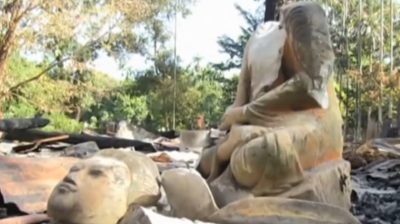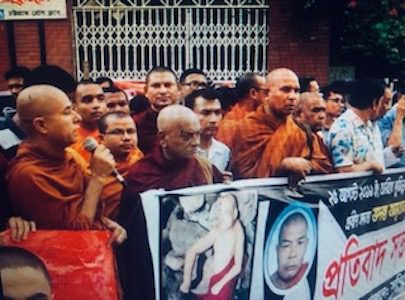Japan and the rule of law: Bangladesh and Buddhist persecution in the Chittagong Hill Tracts
Kanako Mita, Sawako Utsumi, and Lee Jay Walker
Modern Tokyo Times

Prime Minister Fumio Kishida of Japan – copying the President Joe Biden mantra of America on a smaller scale – sprouts the usual empty words to further the military clout of this nation. Accordingly, the latest loopholes in doubling the military budget come under the mantra of “open and free Asia Pacific” and “rule of law.”
Naturally, America cared little about the “rule of law” from Agent Orange to lies about Weapons of Mass Destruction before invading Iraq. However, like other G7 nations, selective memory loss works – providing you have a compliant press and the political opposition is weak.
Kyodo News reports, “Japan decided Wednesday to provide equipment to the armed forces of “like-minded” countries that share its values, such as the rule of law, to improve their defense capabilities to deal with regional security threats, including China’s military buildup in the Indo-Pacific.”
The nations chosen in the Asia Pacific are Bangladesh, Fiji, Malaysia, and the Philippines. Hence, new grant assistance – in heavily indebted Japan – will be provided to “create a favorable security environment” that serves the national interests of Japan.
Once more, Japan cares little about human rights and the “rule of law” outside of anti-China and anti-Russian Federation rhetoric. Accordingly, unlike the Buddhist Buryats of the Russian Federation who have freedom, the indigenous Buddhists of the Chittagong Hill Tracts (some are Christian and Hindu) face endless Islamization tied to mass Bengali migration, which is altering the ethnic and religious dynamics of this region.
Bangladesh and Indonesia both utilize ethnicity and Islam to crush the Buddhists of the Chittagong Hill Tracts and the indigenous of West Papua. Hence, for Japan to ignore decades of anti-Buddhist attacks in the Chittagong Hill Tracts says much about the “rule of law” and “like-minded” nations.
The British betrayal of the indigenous Buddhists of the Chittagong Hill Tracts was witnessed by the partition of India – and the negation of any protection for the people of this region. Accordingly, the British forced the mainly Buddhists of the Chittagong Hill Tracts to become part of Muslim-dominated Pakistan.
Decades later and new convulsions would develop based on Bangladesh becoming independent from Pakistan after a brutal war between West Pakistan and East Pakistan. However, Bangladesh was no solace for the mainly Buddhists of the Chittagong Hill Tracts. Instead, mass Bengali Muslim migration from 1971 (Bangladesh became independent) altered the religious and cultural landscape of the Chittagong Hill Tracts concerning Islamization and endless Bengali settlements.

The British knew that Buddhists and Hindus – just like Nestorian Christians and Zoroastrians in history – would face a horrendous fate concerning the Islamization of areas cut out of mother India. Equally, the British fully understood the reality of Islamic Sharia law and that non-Muslims would face institutional discrimination based on 1,300 years of Islamic history that took the sword to Buddhists and Hindus.
Despite this, the British suddenly turned the mainly Buddhists of the Chittagong Hill Tracts – and the Hindus of Bangladesh and Pakistan – over to a faith that had devastated the Indian subcontinent and further afield. Indeed, countless Islamic invasions and the British Empire have been detrimental to Buddhists and Hindus alike on the Indian subcontinent and stretching to Myanmar.
Al Jazeera reports, “The Hill Tracts are geographically, linguistically, and culturally far-removed from the Bengalis of the Delta. They have much more in common with the people of northeast India or Myanmar.”
Survival International in 2014 reports, “The government of Bangladesh has moved hundreds of thousands of settlers into the Chittagong Hill Tracts, home to eleven tribes collectively known as Jummas. The indigenous Jummas have lost their land to the settlers, and have also been subjected to violent repression by the army.”
Amnesty International says, “The Chittagong Hill Tracts in Bangladesh have been affected by what has been described as “genocide” or “ethnic cleansing” for many years. In the 1960s and 1970s, thousands were forced off their lands to make way for reservoirs and hydroelectric schemes, a displacement made worse by massacres against the Jumma people (the collective name for all indigenous peoples in the region), and nearly twenty years of conflict against a military dictatorship and also with the democratic government of Bangladesh. This only ended in 1997 when a peace accord recognized the rights of the Jumma people over their lands. This accord remains largely unimplemented and the Jumma people are not even acknowledged in the Bangladesh constitution.”
Amnesty International continues, “Violence, particularly sexual violence, is routinely carried out by settlers and the military alike. The figures make for sickening reading: in 2014 alone 117 indigenous women faced physical and sexual abuse, 57% of these being children. Twenty one of these women were raped or gang-raped and seven were killed afterwards.”
Bangladesh faces political problems outside of the Chittagong Hill Tracts because Hindus also face attacks by Islamists – or from ordinary Muslims over land and other serious issues. For example, many reports stress that Hindu girls and young females face enormous pressure to convert to Islam in Bangladesh.
Japan – like other G7 nations and ASEAN – appears to care little for the mainly indigenous Buddhists of the Chittagong Hill Tracts. Similar to Japan not caring about the ongoing Javanization and Islamization of West Papua. Therefore, Bangladesh and Indonesia have continued with decades of oppression against the indigenous of the Chittagong Hill Tracts and West Papua.
https://www.aljazeera.com/features/2015/6/24/bangladesh-indigenous-ban-worse-than-apartheid

Modern Tokyo News is part of the Modern Tokyo Times group
http://moderntokyotimes.com Modern Tokyo Times – International News and Japan News
http://sawakoart.com – Sawako Utsumi’s website and Modern Tokyo Times artist
https://moderntokyonews.com Modern Tokyo News – Tokyo News and International News
PLEASE JOIN ON TWITTER
https://twitter.com/MTT_News Modern Tokyo Times
PLEASE JOIN ON FACEBOOK